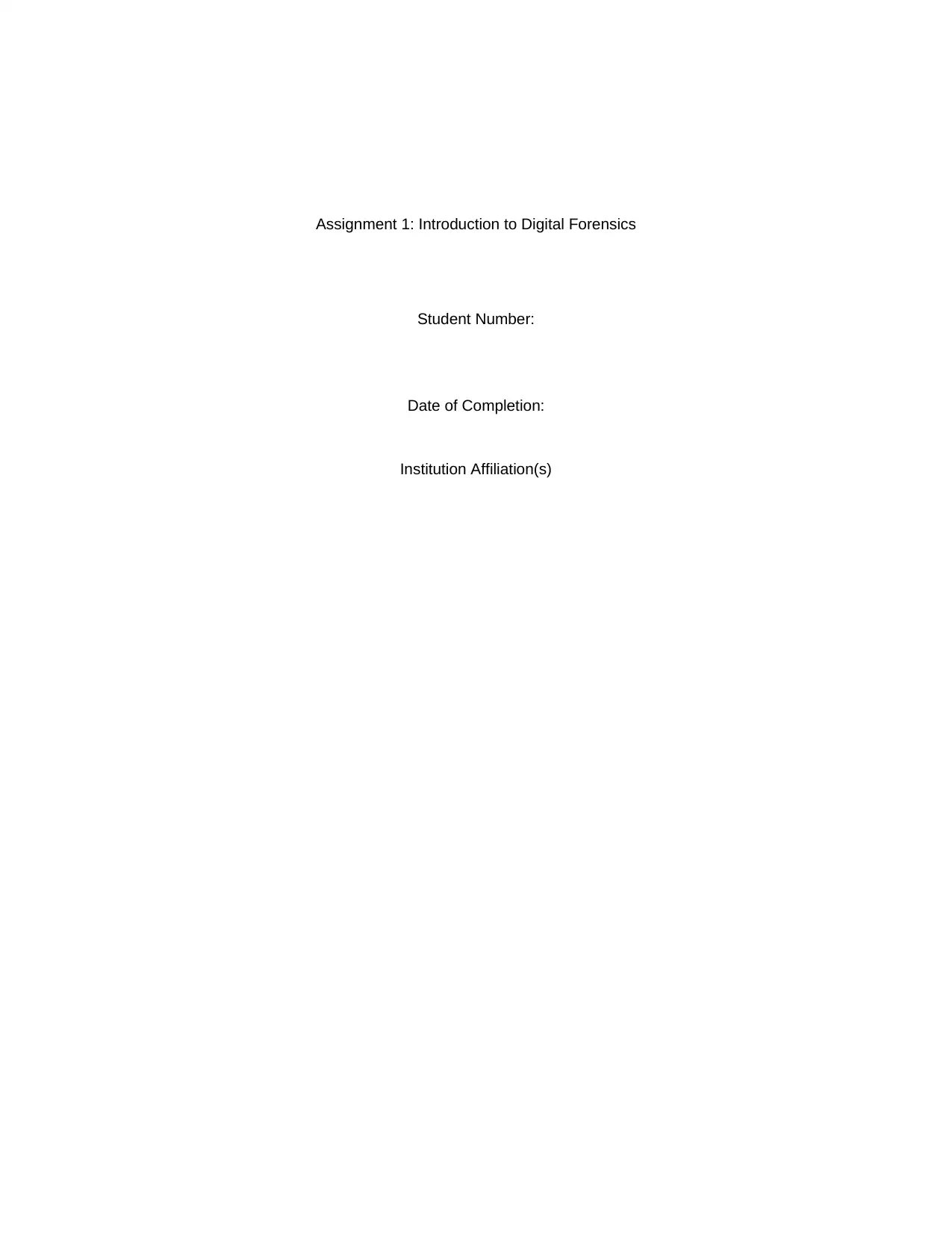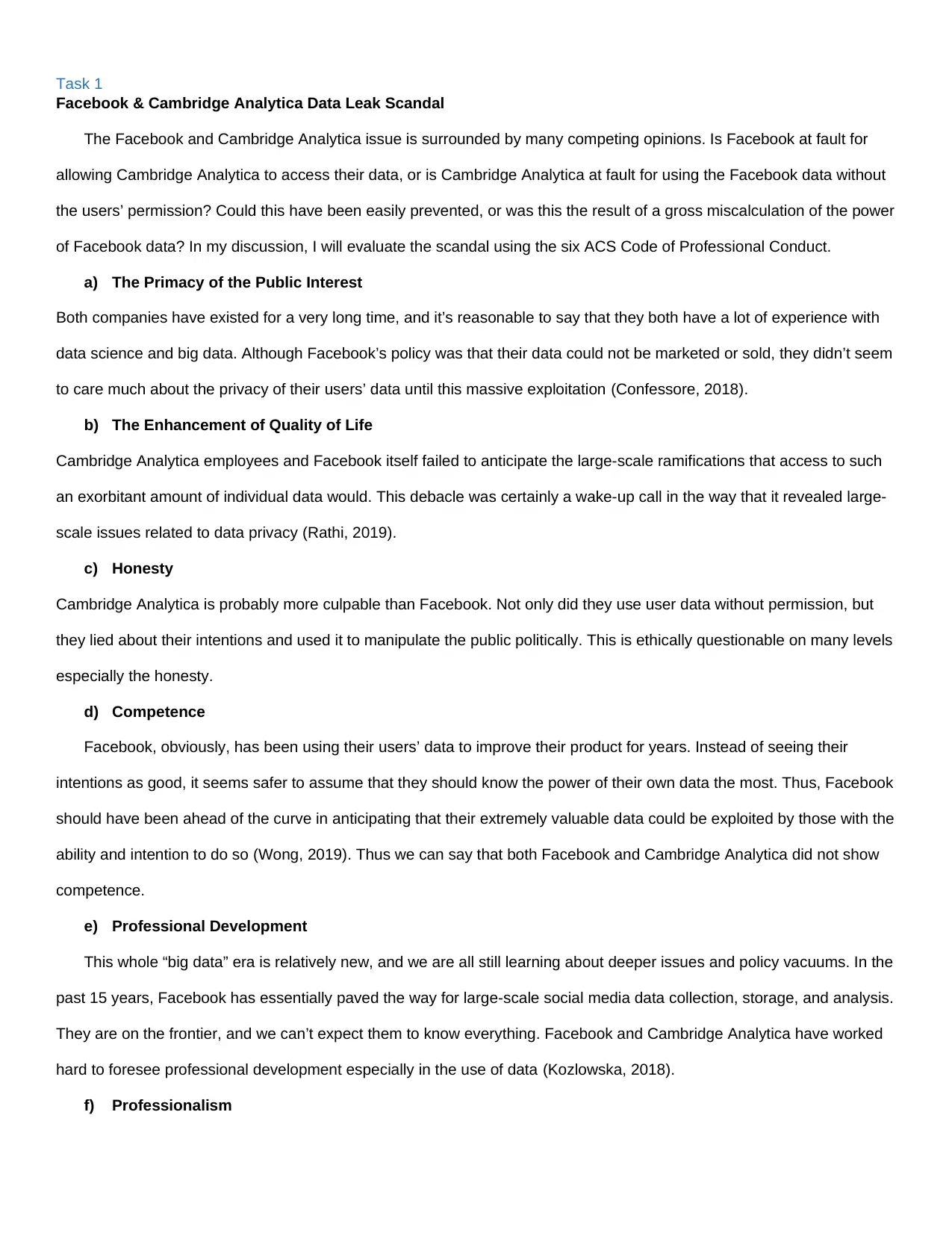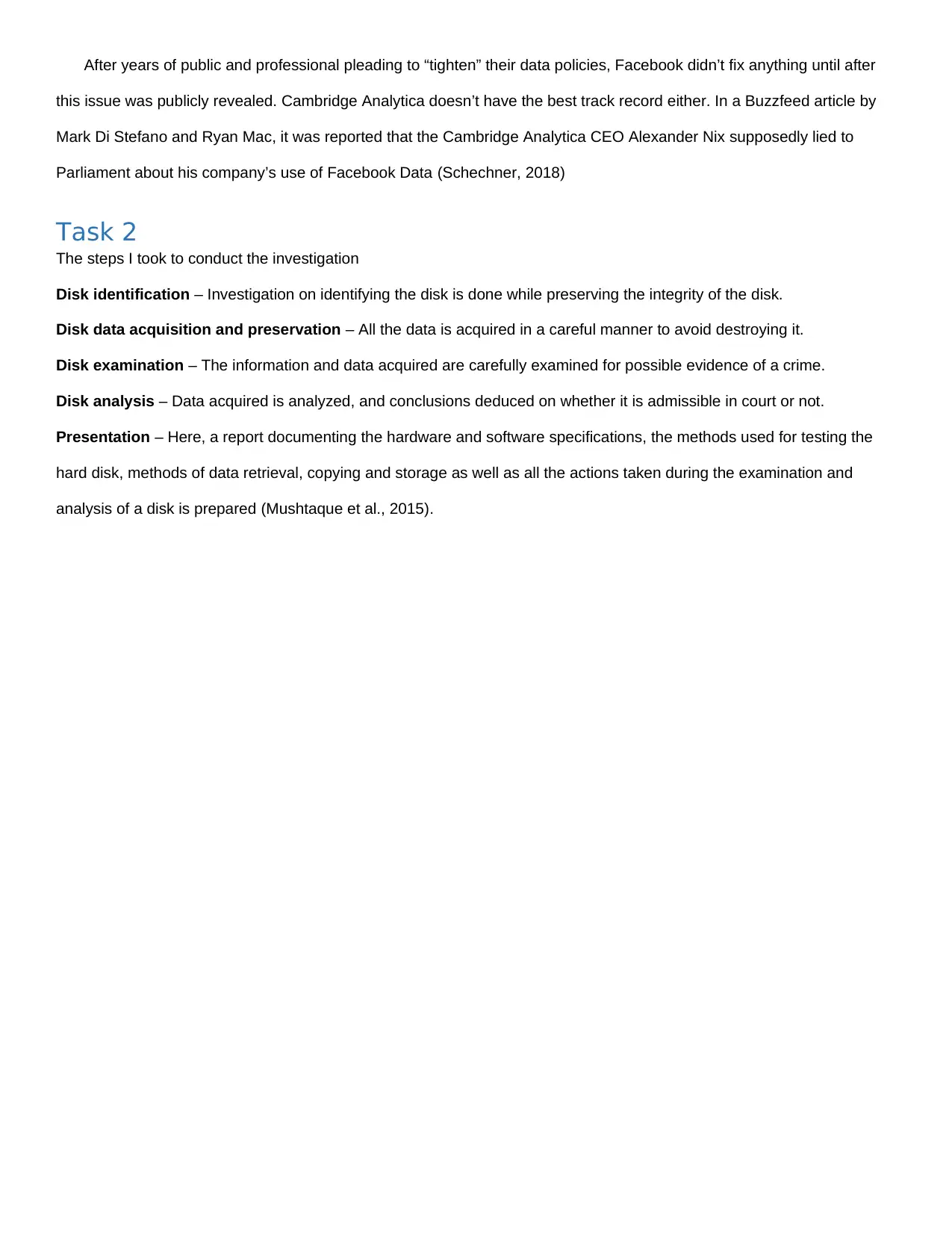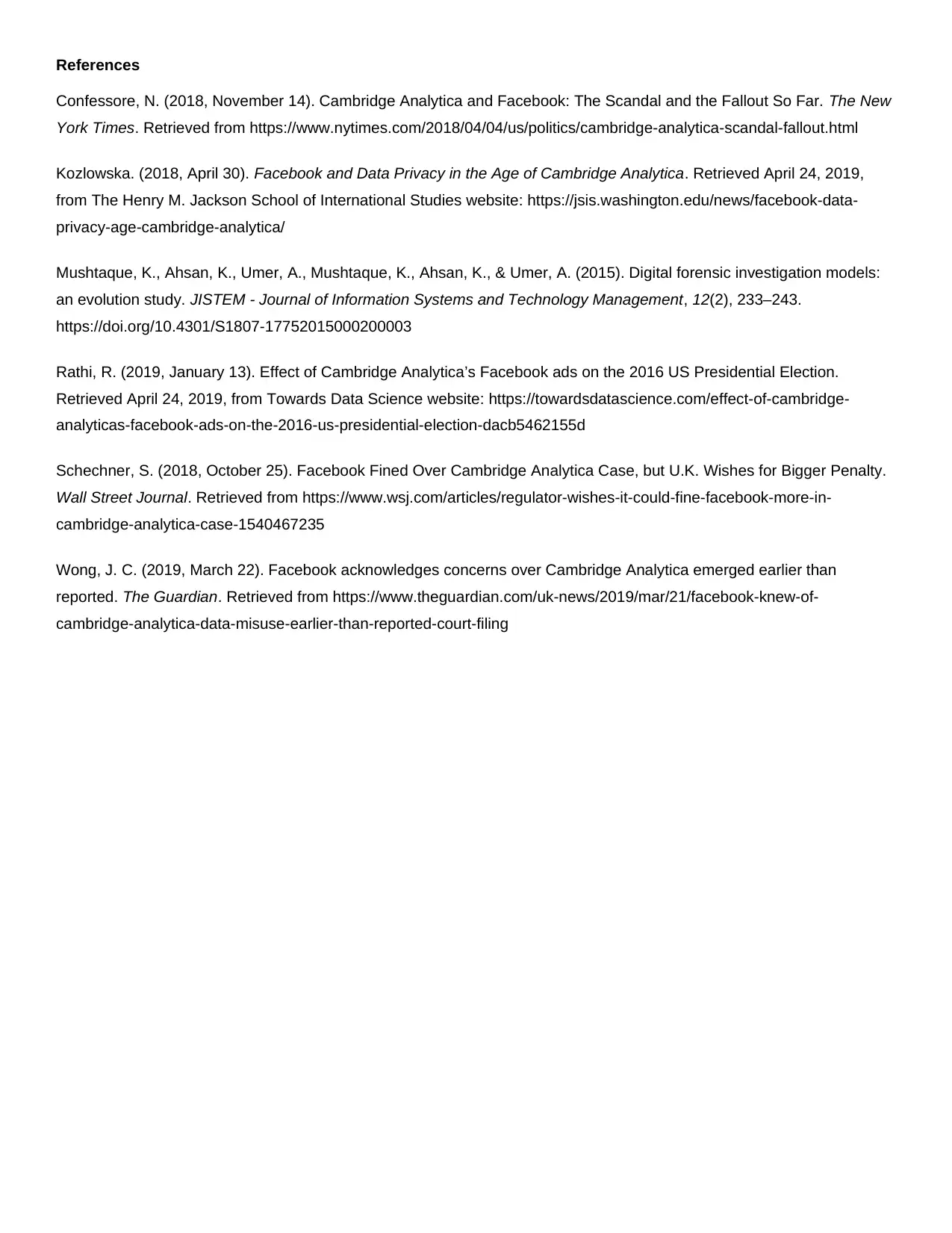Digital Forensics Assignment 1: Data Leak & Investigation Process
VerifiedAdded on 2023/01/20
|4
|950
|79
Homework Assignment
AI Summary
This homework assignment delves into the Facebook and Cambridge Analytica data leak scandal, analyzing the ethical implications and the investigation processes. The student evaluates the scandal using the six ACS Code of Professional Conduct, considering the primacy of public interest, enhancement of quality of life, honesty, competence, professional development, and professionalism of both Facebook and Cambridge Analytica. The assignment further outlines the steps taken to conduct a digital forensic investigation, including disk identification, data acquisition and preservation, examination, analysis, and presentation of findings. The student provides references to support their analysis. The assignment provides a comprehensive overview of the data breach and the associated forensic processes.

Assignment 1: Introduction to Digital Forensics
Student Number:
Date of Completion:
Institution Affiliation(s)
Student Number:
Date of Completion:
Institution Affiliation(s)
Paraphrase This Document
Need a fresh take? Get an instant paraphrase of this document with our AI Paraphraser

Task 1
Facebook & Cambridge Analytica Data Leak Scandal
The Facebook and Cambridge Analytica issue is surrounded by many competing opinions. Is Facebook at fault for
allowing Cambridge Analytica to access their data, or is Cambridge Analytica at fault for using the Facebook data without
the users’ permission? Could this have been easily prevented, or was this the result of a gross miscalculation of the power
of Facebook data? In my discussion, I will evaluate the scandal using the six ACS Code of Professional Conduct.
a) The Primacy of the Public Interest
Both companies have existed for a very long time, and it’s reasonable to say that they both have a lot of experience with
data science and big data. Although Facebook’s policy was that their data could not be marketed or sold, they didn’t seem
to care much about the privacy of their users’ data until this massive exploitation (Confessore, 2018).
b) The Enhancement of Quality of Life
Cambridge Analytica employees and Facebook itself failed to anticipate the large-scale ramifications that access to such
an exorbitant amount of individual data would. This debacle was certainly a wake-up call in the way that it revealed large-
scale issues related to data privacy (Rathi, 2019).
c) Honesty
Cambridge Analytica is probably more culpable than Facebook. Not only did they use user data without permission, but
they lied about their intentions and used it to manipulate the public politically. This is ethically questionable on many levels
especially the honesty.
d) Competence
Facebook, obviously, has been using their users’ data to improve their product for years. Instead of seeing their
intentions as good, it seems safer to assume that they should know the power of their own data the most. Thus, Facebook
should have been ahead of the curve in anticipating that their extremely valuable data could be exploited by those with the
ability and intention to do so (Wong, 2019). Thus we can say that both Facebook and Cambridge Analytica did not show
competence.
e) Professional Development
This whole “big data” era is relatively new, and we are all still learning about deeper issues and policy vacuums. In the
past 15 years, Facebook has essentially paved the way for large-scale social media data collection, storage, and analysis.
They are on the frontier, and we can’t expect them to know everything. Facebook and Cambridge Analytica have worked
hard to foresee professional development especially in the use of data (Kozlowska, 2018).
f) Professionalism
Facebook & Cambridge Analytica Data Leak Scandal
The Facebook and Cambridge Analytica issue is surrounded by many competing opinions. Is Facebook at fault for
allowing Cambridge Analytica to access their data, or is Cambridge Analytica at fault for using the Facebook data without
the users’ permission? Could this have been easily prevented, or was this the result of a gross miscalculation of the power
of Facebook data? In my discussion, I will evaluate the scandal using the six ACS Code of Professional Conduct.
a) The Primacy of the Public Interest
Both companies have existed for a very long time, and it’s reasonable to say that they both have a lot of experience with
data science and big data. Although Facebook’s policy was that their data could not be marketed or sold, they didn’t seem
to care much about the privacy of their users’ data until this massive exploitation (Confessore, 2018).
b) The Enhancement of Quality of Life
Cambridge Analytica employees and Facebook itself failed to anticipate the large-scale ramifications that access to such
an exorbitant amount of individual data would. This debacle was certainly a wake-up call in the way that it revealed large-
scale issues related to data privacy (Rathi, 2019).
c) Honesty
Cambridge Analytica is probably more culpable than Facebook. Not only did they use user data without permission, but
they lied about their intentions and used it to manipulate the public politically. This is ethically questionable on many levels
especially the honesty.
d) Competence
Facebook, obviously, has been using their users’ data to improve their product for years. Instead of seeing their
intentions as good, it seems safer to assume that they should know the power of their own data the most. Thus, Facebook
should have been ahead of the curve in anticipating that their extremely valuable data could be exploited by those with the
ability and intention to do so (Wong, 2019). Thus we can say that both Facebook and Cambridge Analytica did not show
competence.
e) Professional Development
This whole “big data” era is relatively new, and we are all still learning about deeper issues and policy vacuums. In the
past 15 years, Facebook has essentially paved the way for large-scale social media data collection, storage, and analysis.
They are on the frontier, and we can’t expect them to know everything. Facebook and Cambridge Analytica have worked
hard to foresee professional development especially in the use of data (Kozlowska, 2018).
f) Professionalism

After years of public and professional pleading to “tighten” their data policies, Facebook didn’t fix anything until after
this issue was publicly revealed. Cambridge Analytica doesn’t have the best track record either. In a Buzzfeed article by
Mark Di Stefano and Ryan Mac, it was reported that the Cambridge Analytica CEO Alexander Nix supposedly lied to
Parliament about his company’s use of Facebook Data (Schechner, 2018)
Task 2
The steps I took to conduct the investigation
Disk identification – Investigation on identifying the disk is done while preserving the integrity of the disk.
Disk data acquisition and preservation – All the data is acquired in a careful manner to avoid destroying it.
Disk examination – The information and data acquired are carefully examined for possible evidence of a crime.
Disk analysis – Data acquired is analyzed, and conclusions deduced on whether it is admissible in court or not.
Presentation – Here, a report documenting the hardware and software specifications, the methods used for testing the
hard disk, methods of data retrieval, copying and storage as well as all the actions taken during the examination and
analysis of a disk is prepared (Mushtaque et al., 2015).
this issue was publicly revealed. Cambridge Analytica doesn’t have the best track record either. In a Buzzfeed article by
Mark Di Stefano and Ryan Mac, it was reported that the Cambridge Analytica CEO Alexander Nix supposedly lied to
Parliament about his company’s use of Facebook Data (Schechner, 2018)
Task 2
The steps I took to conduct the investigation
Disk identification – Investigation on identifying the disk is done while preserving the integrity of the disk.
Disk data acquisition and preservation – All the data is acquired in a careful manner to avoid destroying it.
Disk examination – The information and data acquired are carefully examined for possible evidence of a crime.
Disk analysis – Data acquired is analyzed, and conclusions deduced on whether it is admissible in court or not.
Presentation – Here, a report documenting the hardware and software specifications, the methods used for testing the
hard disk, methods of data retrieval, copying and storage as well as all the actions taken during the examination and
analysis of a disk is prepared (Mushtaque et al., 2015).
⊘ This is a preview!⊘
Do you want full access?
Subscribe today to unlock all pages.

Trusted by 1+ million students worldwide

References
Confessore, N. (2018, November 14). Cambridge Analytica and Facebook: The Scandal and the Fallout So Far. The New
York Times. Retrieved from https://www.nytimes.com/2018/04/04/us/politics/cambridge-analytica-scandal-fallout.html
Kozlowska. (2018, April 30). Facebook and Data Privacy in the Age of Cambridge Analytica. Retrieved April 24, 2019,
from The Henry M. Jackson School of International Studies website: https://jsis.washington.edu/news/facebook-data-
privacy-age-cambridge-analytica/
Mushtaque, K., Ahsan, K., Umer, A., Mushtaque, K., Ahsan, K., & Umer, A. (2015). Digital forensic investigation models:
an evolution study. JISTEM - Journal of Information Systems and Technology Management, 12(2), 233–243.
https://doi.org/10.4301/S1807-17752015000200003
Rathi, R. (2019, January 13). Effect of Cambridge Analytica’s Facebook ads on the 2016 US Presidential Election.
Retrieved April 24, 2019, from Towards Data Science website: https://towardsdatascience.com/effect-of-cambridge-
analyticas-facebook-ads-on-the-2016-us-presidential-election-dacb5462155d
Schechner, S. (2018, October 25). Facebook Fined Over Cambridge Analytica Case, but U.K. Wishes for Bigger Penalty.
Wall Street Journal. Retrieved from https://www.wsj.com/articles/regulator-wishes-it-could-fine-facebook-more-in-
cambridge-analytica-case-1540467235
Wong, J. C. (2019, March 22). Facebook acknowledges concerns over Cambridge Analytica emerged earlier than
reported. The Guardian. Retrieved from https://www.theguardian.com/uk-news/2019/mar/21/facebook-knew-of-
cambridge-analytica-data-misuse-earlier-than-reported-court-filing
Confessore, N. (2018, November 14). Cambridge Analytica and Facebook: The Scandal and the Fallout So Far. The New
York Times. Retrieved from https://www.nytimes.com/2018/04/04/us/politics/cambridge-analytica-scandal-fallout.html
Kozlowska. (2018, April 30). Facebook and Data Privacy in the Age of Cambridge Analytica. Retrieved April 24, 2019,
from The Henry M. Jackson School of International Studies website: https://jsis.washington.edu/news/facebook-data-
privacy-age-cambridge-analytica/
Mushtaque, K., Ahsan, K., Umer, A., Mushtaque, K., Ahsan, K., & Umer, A. (2015). Digital forensic investigation models:
an evolution study. JISTEM - Journal of Information Systems and Technology Management, 12(2), 233–243.
https://doi.org/10.4301/S1807-17752015000200003
Rathi, R. (2019, January 13). Effect of Cambridge Analytica’s Facebook ads on the 2016 US Presidential Election.
Retrieved April 24, 2019, from Towards Data Science website: https://towardsdatascience.com/effect-of-cambridge-
analyticas-facebook-ads-on-the-2016-us-presidential-election-dacb5462155d
Schechner, S. (2018, October 25). Facebook Fined Over Cambridge Analytica Case, but U.K. Wishes for Bigger Penalty.
Wall Street Journal. Retrieved from https://www.wsj.com/articles/regulator-wishes-it-could-fine-facebook-more-in-
cambridge-analytica-case-1540467235
Wong, J. C. (2019, March 22). Facebook acknowledges concerns over Cambridge Analytica emerged earlier than
reported. The Guardian. Retrieved from https://www.theguardian.com/uk-news/2019/mar/21/facebook-knew-of-
cambridge-analytica-data-misuse-earlier-than-reported-court-filing
1 out of 4
Related Documents
Your All-in-One AI-Powered Toolkit for Academic Success.
+13062052269
info@desklib.com
Available 24*7 on WhatsApp / Email
![[object Object]](/_next/static/media/star-bottom.7253800d.svg)
Unlock your academic potential
Copyright © 2020–2026 A2Z Services. All Rights Reserved. Developed and managed by ZUCOL.



